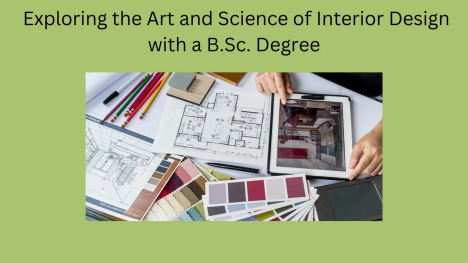Interior design is a blend of creativity and technical skill, where designers create spaces that are both functional and aesthetically pleasing. Pursuing a Bachelor of Science (B.Sc.) degree in Interior Design can provide you with the knowledge and skills needed to excel in this dynamic field. In this guide, we’ll explore the art and science of interior design and how a B.Sc. degree can help you succeed in this exciting industry.
Understanding Interior Design: The Art and Science Blend
Creativity and Innovation: Interior design is a creative field that allows designers to express their artistic vision. From choosing colors and textures to arranging furniture and accessories, designers use their creativity to transform spaces.
Functional Design Principles: While creativity is important, interior design is also grounded in science and practicality. Designers must understand the principles of space planning, ergonomics, and building codes to create functional and safe environments.
Technical Skills: A B.Sc. degree in Interior Design equips students with technical skills such as drafting, computer-aided design (CAD), and 3D modeling. These skills are essential for communicating design ideas effectively to clients and contractors.
Benefits of Pursuing a B.Sc. Degree in Interior Design
Comprehensive Curriculum: B.Sc. programs in Interior Design offer a comprehensive curriculum that covers both the theoretical and practical aspects of design. Students learn about design history, theory, materials, and construction techniques.
Industry-Relevant Skills: The skills acquired in a B.Sc. program are highly relevant to the interior design industry. Graduates are prepared to work in a variety of settings, including residential, commercial, and hospitality design.
Career Opportunities: A B.Sc. degree opens up a range of career opportunities in the interior design field. Graduates can work as interior designers, design consultants, project managers, or even start their own design firms.
Creating Sustainable and People-Centric Designs
Sustainable Design Practices: Interior designers play a crucial role in promoting sustainability by using eco-friendly materials, energy-efficient systems, and sustainable design principles.
Client-Centric Approach: Successful interior design is not just about creating beautiful spaces but also about understanding and meeting the needs of clients. Designers must listen to clients’ requirements, preferences, and budget constraints to create spaces that reflect their personality and lifestyle.
Conclusion
A B.Sc. degree in Interior Design offers a unique blend of creativity and technical skill, preparing students for successful careers in this dynamic field. By understanding the art and science of interior design, graduates can create innovative, functional, and sustainable spaces that enhance people’s lives.
If you have a passion for design and a desire to create beautiful and functional spaces, consider pursuing a B.Sc. degree in Interior Design to embark on a rewarding career in this exciting industry.




